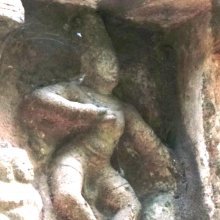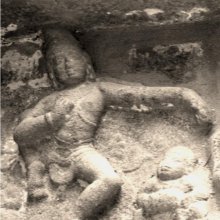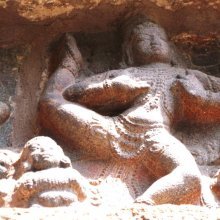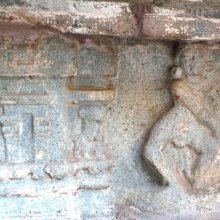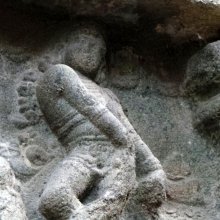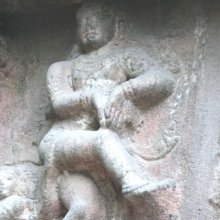Dola, Dolā, Ḍola: 23 definitions
Introduction:
Dola means something in Buddhism, Pali, Hinduism, Sanskrit, Marathi, Jainism, Prakrit, Hindi, biology. If you want to know the exact meaning, history, etymology or English translation of this term then check out the descriptions on this page. Add your comment or reference to a book if you want to contribute to this summary article.
Alternative spellings of this word include Dol.
Images (photo gallery)
(+9 more images available)
In Hinduism
Natyashastra (theatrics and dramaturgy)
Source: Wisdom Library: Nāṭya-śāstraDola (दोल) refers to a gesture (āṅgika) made with ‘combined hands’ (saṃyuta), according to the Nāṭyaśāstra chapter 8. The hands (hasta) form a part of the human body which represents one of the six major limbs (aṅga) used in dramatic performance. With these limbs are made the various gestures (āṅgika), which form a part of the histrionic representation (abhinaya).
Source: archive.org: The mirror of gesture (abhinaya-darpana)One of the saṃyutta-hastāni (Twenty-four combined Hands).—Ḍola (swing): two Patāka hands placed on the thighs. Usage: beginning a Nāṭya.
According to another book : Patāka hands at the sides. The patron deity is Bharatī. Usage: infatuation, fainting, drunken indolence, welcoming the beloved (vilāsa) , etc.
Source: archive.org: Natya ShastraDola (दोल).—A type of gesture (āṅgika) made with combined hands (saṃyuta-hasta);—(Instructions): When the two shoulders are at ease in a Karaṇa and the two Patāka hands are hanging down the Dola hand is produced.
(Uses): It is to be used in indicating hurry, sadness, fainting, fit of intoxication, excitement, state of illness and wound by a weapon.
Source: Shodhganga: Elements of Art and Architecture in the Trtiyakhanda of the Visnudharmottarapurana (natya)Dolā (दोला) refers to one of the thirteen Saṃyuktahastas or “combined hand gestures” (in Indian Dramas), according to the Viṣṇudharmottarapurāṇa, an ancient Sanskrit text which (being encyclopedic in nature) deals with a variety of cultural topics such as arts, architecture, music, grammar and astronomy.—The hasta-mudrās (lit. “hand-gestures”) are very essential to denote some particular action or state in dancing and these mudrās are formed with the help of hands and fingers.—According to the Śabdakalpadruma, dolā means a kind of swing playing stuff, generally stays in gardens and made with wood. When both of the hands are hanging downward in patāka posture it is called dolā. This posture signifies meditation, giving charity and edible things. In the Nāṭyaśāstra, this posture is said to indicate rush, grief, faint, fit of intoxication, emotion, illness and hit by weapon.

Natyashastra (नाट्यशास्त्र, nāṭyaśāstra) refers to both the ancient Indian tradition (shastra) of performing arts, (natya—theatrics, drama, dance, music), as well as the name of a Sanskrit work dealing with these subjects. It also teaches the rules for composing Dramatic plays (nataka), construction and performance of Theater, and Poetic works (kavya).
Shilpashastra (iconography)
Source: Shodhganga: The significance of the mūla-beras (śilpa)Dolā (दोला) or Dolāhasta refers to “dangling” and represents one of the four Elirkai gestures, as defined according to texts dealing with śilpa (arts and crafs), known as śilpaśāstras.—Accordingly, pratimā-lakṣaṇa (body postures of the icons) is comprised of hand gestures (hasta, mudrā or kai-amaiti), stances/poses (āsanas) and inflexions of the body (bhaṅgas). There are thirty-two types of hands [viz., dolā-hasta] classified into two major groups known as tolirkai (functional and expressive gestures) and elirkai (graceful posture of the hand).

Shilpashastra (शिल्पशास्त्र, śilpaśāstra) represents the ancient Indian science (shastra) of creative arts (shilpa) such as sculpture, iconography and painting. Closely related to Vastushastra (architecture), they often share the same literature.
In Buddhism
Theravada (major branch of Buddhism)
Source: Pali Kanon: Pali Proper NamesA minister of Devanampiyatissa. Sanghamitta lived in his house before the Upasikarama was built, so did Anula till her ordination. MT. 388, 408.
Theravāda is a major branch of Buddhism having the the Pali canon (tipitaka) as their canonical literature, which includes the vinaya-pitaka (monastic rules), the sutta-pitaka (Buddhist sermons) and the abhidhamma-pitaka (philosophy and psychology).
Biology (plants and animals)
Source: Google Books: CRC World Dictionary (Regional names)Dola in India is the name of a plant defined with Indigofera tinctoria in various botanical sources. This page contains potential references in Ayurveda, modern medicine, and other folk traditions or local practices It has the synonym Indigofera sumatrana Gaertn. (among others).
Example references for further research on medicinal uses or toxicity (see latin names for full list):
· Flora Aegyptiaco-Arabica (1775)
· Novon (1994)
· Bulletin of the Botanical Society of Bengal (1980)
· The Gardeners Dictionary
· Journal of Ethnopharmacology (2006)
· Flora of Jamaica containing descriptions of the flowering plants known from the island (1920)
If you are looking for specific details regarding Dola, for example health benefits, pregnancy safety, extract dosage, side effects, chemical composition, diet and recipes, have a look at these references.

This sections includes definitions from the five kingdoms of living things: Animals, Plants, Fungi, Protists and Monera. It will include both the official binomial nomenclature (scientific names usually in Latin) as well as regional spellings and variants.
Languages of India and abroad
Pali-English dictionary
Source: BuddhaSasana: Concise Pali-English Dictionarydolā : (f.) a swing; palanquin.
Source: Sutta: The Pali Text Society's Pali-English DictionaryDolā, (f.) (Sk. dolā, *del as in Ags. tealtian=E. tilt, adj. tealt unstable=Sk. dulā iṣṭakā an unstable woman) a swing J.IV, 283; VI, 341; Vism.280 (in simile). (Page 331)

Pali is the language of the Tipiṭaka, which is the sacred canon of Theravāda Buddhism and contains much of the Buddha’s speech. Closeley related to Sanskrit, both languages are used interchangeably between religions.
Marathi-English dictionary
Source: DDSA: The Molesworth Marathi and English Dictionaryḍōla (डोल).—m ( A) A bucket or pail. 2 A mast of a ship or boat. 3 (See ḍōlhārā) The swinging cot for dēvī &c. 4 Moving from side to side in walking or sitting; reeling or waddling. v dē.
--- OR ---
ḍōlā (डोला).—m (dōlā S Swing &c.) The tābūta or bier of & carried about in procession by Muhammadans at the Muharram.
--- OR ---
ḍōḷa (डोळ).—m Pulse roughly ground (that it may be husked). 2 Grains or half grains amongst split pulse of which the husks have remained: also a single such grain or half grain. 3 n Evil surmising, suspicion (i. e. a black grain of pulse in the mind). v paḍa, yē. 4 f A large fishing net, a seine.
--- OR ---
ḍōḷā (डोळा).—m An eye. 2 fig. Sight, vision, attention, regard &c. 3 A little hole;--as burnt in a cloth, burst through a vessel &c. 4 The eye of the peacock's fan. 5 The eye (of a coconnut, cashewnut, a sugarcane, potato &c.) 6 The eye of the leg, i. e. the anklebone. 7 The cavity on the side of the knee; observable on stretching the leg. 8 A source in general of knowledge or information; viz. a Shastra or scientific treatise, a scout or emissary, the Mahar of a village &c. 9 A scale of a fish; a square of a custard apple, pine apple &c. 10 (In Khandesh.) A measure of capacity, of sixteen sher or ⅓ of a pāyalī. (The pāyalī there is forty-eight sher. As three ḍōḷē make one pāya- lī, so twelve ḍōḷē or four pāyalī make one māpa, and sixty māpēṃ make ēkasāṭha. One fourth of a pāyalī or twelve sher is cauthā or cōthā) 11 The dint or little cavity in the flint of the potter's wheel. cāra ḍōḷē hōṇēṃ g. of s. & o. reciprocally. To have an interview, to meet. ḍōḷā ōḷakhaṇēṃ g. of o. To be acquainted with the whims, ways, and will of, or with the mind of. ḍōḷā kāṇā asāvā mulūka kāṇā asūṃ nayē Let there be Eye-blindness, but let there not be Civil darkness and disorder. ḍōḷā ghālaṇēṃ To wink; to intimate by the eye: also to cast the eye at; to glance at. ḍōḷā cukāviṇēṃ or māraṇēṃ g. of o. To elude the observation of. ḍōḷā jāṇaṇēṃ-samajaṇēṃ-tāḍaṇēṃ To discern the mind of. ḍōḷā na phuṭē kāḍī na mōḍē hyā rītīnēṃ karaṇēṃ To execute or perform with great care and skill. ḍōḷāṃ prāṇa ṭhēvaṇēṃ See ḍōḷyānta prāṇa ṭhēvaṇēṃ. Ex. mājhī mātā śōkēṃ karūna || ḍōḷāṃ prāṇa ṭhēvīla kī ||. ḍōḷābhara jhōpa A good bit of sleep; and, neg. con., not a wink of sleep. ḍōḷē umāraṇēṃ or gurakāviṇēṃ To browbeat; to scowl; to glare at fiercely. ḍōḷē ughaḍaṇēṃ To open the eyes (to one's duty or interest). ḍōḷā ughaḍata nāhīṃ Said of a disdainful or proud man: also of rain which pours unceasingly. ḍōḷē uraphāṭaṇēṃ-phiraṇēṃ-caḍhaṇēṃ g. of s.To become blind: (as on an accession of wealth &c.) Lit. To start out or turn up or in. ḍōḷēkhāṇēṃ g. of s. To nod from drowsiness. ḍōḷēgāṃvacīṃ kavāḍēṃ lāgalīṃ (I, he &c.) am blind. ḍōḷē caḍhaṇēṃ g. of s. To look fiery--the eyes: (from intoxication, watchfulness, pride.) ḍōḷē caḍhavūna bōlaṇēṃ To speak sharply and angrily. ḍōḷē jaḷaṇēṃ g. of s. To burn with envy; to be pained at the sight of. ḍōḷē jhāṅkaṇēṃ or ḍhāmpaṇēṃ To be remiss, heedless, careless. 2 To connive at or to overlook. 3 To close the eyes in death. ḍōḷē ṭaḷaṭaḷīta bharaṇēṃ g. of s. To have one's eyes glistening with tears. ḍōḷē tāṭhaṇēṃ g. of s. To become haughty or disdainful. ḍōḷē tāmbāraṇēṃ (To make the eyes red upon.) To glare at fiercely. ḍōḷē nivaṇēṃ or thaṇḍa hōṇēṃ g. of s. To experience the gratification of seeing a much desired person or thing; to obtain the desire of one's eyes. ḍōḷē nivaḷaṇēṃ g. of s. To get one's eyes clean and bright again after ophthalmia &c. 2 fig. To recover clear mental vision (after any infatuation). ḍōḷē paṭhārāsa jāṇēṃ g. of s. To have sunken eyes (eyes gone down into the back) from fasting or disease or in death. ḍōḷē pāṇḍharē karaṇēṃ g. of o. To beat unmercifully. 2 g. of s. To be on the point of death. ḍōḷē pātāḷānta jāṇēṃ g. of s. To have one's eyes sink in. ḍōḷē pāpī The eyes spoken of as (ever) lascivious or wanton. ḍōḷē pāhūna vāgaṇēṃ or cālaṇēṃ g. of o. To conduct one's self with obsequious conformity to the will of. ḍōḷē piñjāraṇēṃ or phindāraṇēṃ or phāḍaṇēṃ To look fiercely; to glare at angrily. ḍōḷē pusaṇēṃ (To wipe or rub the eyes.) To cry, blubber, pipe. 2 g. of o. To comfort or console; to wipe the tears of. ḍōḷē pōṇḍhaḷaṇēṃ g. of s. To get sinking or hollowness of eyes. ḍōḷē phāṭaṇēṃ g. of s. To have one's expectations enlarged. ḍōḷē phāḍaṇēṃ To set the eyes and glare (as in death). ḍōḷē phiraṇēṃ g. of s. To be dizzy or to have swimming in the eyes. 2 fig. To become disdainful or supercilious. 3 To turn up the eyes (in dying). 4 To change the mind (as from an agreement); to fight shy. ḍōḷē phiraviṇēṃ To turn up the eyes; to be dying: also to glare at angrily; or to begin to look at with estrangement or disfavor. ḍōḷē phuṭaṇēṃ g. of s. To become blind or impaired in vision. 2 To be pained at the sight (of another's prosperity or success). ḍōḷē bāndhaṇēṃ To fascinate the eyes (as by spells and charms). 2 To blindfold, hoodwink, befool, bamboozle. ḍōḷēbhara or bharūna pāhaṇēṃ To feast the eyes upon; to fill the sight with. ḍōḷē muraḍhaṇēṃ To cast the eyes askance; to look aside. ḍōḷē mōḍaṇēṃ To wink at or leer at; to ogle or shoot glances. Ex. ḍōḷē mōḍūna vāṅkulyā dāvī || ghulakāvīta māna paiṃ ||. 2 To turn up the eyes fastidiously or superciliously ḍōḷē yēṇēṃ in. con. To obtain sight--a blind person. ḍōḷē yēṇēṃ or ḍōḷē viṇēṃ g. ofs. To get ophthalmia. ḍōḷē lavaṇēṃ g. ofs. To have a twitching in the eyes. A favorable indication. ḍōḷē hōṇēṃ in. con. To become acquainted with or aware of (any business or study, the wiles of another &c.) ḍōḷyāñcā andhāra karaṇēṃ To err against light. ḍōḷyāñcī khōgarēṃ or ḍōḷyāñcyā khāñcā or ḍōḷyāṃ- cī bhinta hōṇēṃ g. of s. To become or be stone blind. ḍōḷyāñcyā vātī karaṇēṃ To strain the eyes. ḍōḷyāñcēṃ pāraṇēṃ phiṭaṇēṃ or hōṇēṃ To see at length an object or an accomplishment anxiously longed after; to have the desire of one's eyes gratified. ḍōḷyānta kurūpa or kurunda asaṇēṃ g. of s. To be envious about: also to have hatred or a grudge against. ḍōḷyānta khupaṇēṃ or salaṇēṃ To pain the eyes--another's merit, wealth &c. ḍōḷyānta jahara utaraṇēṃ To be pained at the sight of (another's fortune &c.) ḍōḷyānta tēla ghālūna japaṇēṃ To watch intently; to be very vigilant. ḍōḷyānta tēla ghālūna pāhaṇēṃ To inspect narrowly; to pore over; to pry or peer into. ḍōḷyānta dhūḷa or mātī ghālaṇēṃ To throw dust into the eyes of; to blind. ḍōḷyānta pāṇī nasaṇēṃ g. of s. To have no reverence for or sense of shame at: or -asaṇēṃ To have shame, modesty &c. ḍōḷyānta prāṇa ṭhēvaṇēṃ To be ready to die after seeing. See below. ḍōḷyānta prāṇa yēṇēṃ or uraṇēṃ To be in the last lingerings of life; to be tarrying only to see (some greatly desired object). ḍōḷyānta bōṭa ghātalēṃ asatāṃ tarīṃ disata nāhīṃ Used in expression of the sense of gross darkness. ḍōḷyānta bharaṇēṃ To fill or satisfy the sight. ḍōḷyānta mātī paḍaṇēṃ g. of s. To envy. ḍōḷyānta māvaṇēṃ or samāvaṇēṃ g. of o. To be swallowed up or confounded by the scowl or fierce glare of. Gen. neg. con. Ex. tū āpa- lā aisa mī kāṃhīṃ tujhyā ḍōḷyānta māvaṇāra nāhīṃ. ḍōḷyānta vāta ghālūna basaṇēṃ To sit up watching. ḍōḷyānta śarama nasaṇēṃ To be brazenfaced. ḍōḷyānta harāma utaraṇēṃ To be evil in the eyes of. ḍōḷyānnīṃ ujēḍaṇēṃ To watch throughout the night. ḍōḷyānnīṃ māraṇēṃ To strike with amorous glances; to ogle. ḍōḷyānnīṃ (rātra or divasa) kāḍhaṇēṃ or ugaviṇēṃ, To spend (the night or the day) in wakefulness. ḍōḷyāṃvara kātaḍēṃ ōḍhaṇēṃ To connive or wink at. 2 To act blindly and rashly; to resist conviction &c. ḍōḷyāṃvara dhūra yēṇēṃ g.of s. or dhurānēṃ ḍōḷē bharaṇēṃ To be blinded (by riches, honors &c.) ḍōḷyāṃvara paḍaḷa yēṇēṃ g. of s. To become proud-blind. ḍōḷyāṃvara yēṇēṃ g. of o. To be an eyesore unto. 2 g. of s. To get blinded (as by wealth or fame). ḍōḷyāśīṃ ḍōḷā miḷaviṇēṃ To look at audaciously or pertly. ḍōḷyāśīṃ ḍōḷā lāgaṇēṃ To close in sleep--eyes. ḍōḷyāṃsa ṭipēṃ yēṇēṃ To have tears come into the eyes. ḍōḷyāṃsa pāṭā bāndhaṇēṃ (To bind a slab over the eyes.) To close the eyes; to hoodwink; to blind. dōhōṃ ḍōḷyāñcī muravata rākhaṇēṃ To be afraid to look in the face of. rupyācē ḍōḷē hōṇēṃ in con. To have silvery eyes; i. e. to be blind, or to be dying. vāṅkaḍyā ḍōḷyānēṃ pāhaṇēṃ To look sideways, i. e. with timorous yet earnest desire. dusaṛyācyā ḍōḷyānta bōṭa ṭapakana śiratēṃ or jātēṃ expresses great censoriousness or the easiness of c. dōna ḍōḷē śējārīṃ bhēṭa nāhīṃ saṃsārīṃ Applied to a friend in the neighborhood but seldom seen. phuṭakā ḍōḷā kājaḷānēṃ sājarā Applied to a deformity or a defect tricked out or varnished over.
--- OR ---
dōlā (दोला).—m S A swinging seat; a pensile bed; a swing; a traveling litter.
Source: DDSA: The Aryabhusan school dictionary, Marathi-Englishḍōla (डोल).—m A bucket. A mast of a ship Reeling.
--- OR ---
ḍōlā (डोला).—m The tābūta.
--- OR ---
ḍōḷa (डोळ).—m Pulse roughly ground. f A seine or large fishing-net. n Evil surmising.
--- OR ---
ḍōḷā (डोळा).—m An eye. Sight. A little hole. ḍōḷā ghālaṇēṃ Wink; intimate by the eye. ḍōḷā cukaviṇēṃ Elude the observation of. ḍōḷēṃ ughaḍaṇēṃ Open the eyes (to one's in- terest). ḍōḷē jhākaṇēṃ Connive at. Close the eyes in death. ḍōḷē tāṭhaṇēṃ Become haughty or disdainful. ḍōḷē nivaṇēṃ Obtain the desire of one's eyes. ḍōḷē pāṇḍharē karaṇēṃ Beat mercilessly. Be on the point of death. ḍōḷē pusaṇēṃ Comfort or console; wipe the tears of. Cry. ḍōḷē phāṭaṇēṃ Have one's expectations enlarged. ḍōḷē phira- viṇēṃ Turn up the eyes; be dying. ḍōḷē phuṭaṇēṃ Become blind. Be pained at the sight (of another's success). ḍōḷē bharuna pāhaṇēṃ To feast the eyes upon. ḍōḷē mura- ḍhaṇēṃ Cast the eyes askance. ḍōḷē mōṇḍaṇēṃ Wink at; ogle. ḍōḷē yēṇēṃ Get ophthalmia, to have sore eyes. Obtain sight. ḍōḷē lavaṇēṃ Have a twitching in the eyes. ḍōḷyāñcyā khāñcā hōṇēṃ To become stone-blind. ḍōḷyāñcyā vātī karaṇēṃ Strain the eyes. ḍō- ḷyāñcyā pāraṇē phiṭaṇēṃ To have the desire of one's eyes gratified. ḍōḷyānta khupaṇēṃ-salaṇēṃ Pain the eyes-another's merit, &c. ḍōḷyānta tēla ghālūna pāhaṇēṃ Inspect narrowly. ḍōḷyānta dhūḷa phēkaṇēṃ To throw dust into the eyes. ḍōḷyānta pāṇī nasaṇēṃ To have no sense of shame at. ḍōḷyānta prāṇa ṭhēvaṇēṃ Be ready to die after seeing. ḍōḷyānta prāṇa yēṇēṃ Be in the last lingering of life. ḍōḷyānta bharaṇēṃ Fill or satisfy the sight. ḍōḷyānta mātī paḍaṇēṃ Envy. ḍōḷyānta vāta ghālūna basaṇēṃ Sit up watching. ḍōḷyānta śarama nasaṇēṃ Be brazen-faced. ḍōḷyānnī ujaḍaṇēṃ. Watch throughout the night. ḍōḷyāvara kātaḍhēṃ ōḍhaṇēṃ Connive at. ḍōḷyāṃvara dhūra yēṇēṃ. Be blin- ded (by riches, &c.) ḍōḷyāṃvara paḍaḷa yēṇēṃ. To be proud-blind ḍōḷyāṃvara yēṇēṃ To be an eye-sore to. ḍōḷyāśīṃ ḍōḷā miḷavaṇēṃ. To look at audaciously. ḍōḷyāśīṃ ḍōḷā lāgaṇēṃ. To close the eyes–in sleep. rupyā- cē ḍōḷē phōḍaṇēṃ To be blind or to be dying. ḍōḷyāmpuḍhē kājava disaṇēṃ To be dizzy. ḍōḷyānta kēra āṇi kānānta phuṅkara To apply a wrong remedy to a wrong disease.
--- OR ---
dōlā (दोला).—m A swinging seat; a pensile bed.
Marathi is an Indo-European language having over 70 million native speakers people in (predominantly) Maharashtra India. Marathi, like many other Indo-Aryan languages, evolved from early forms of Prakrit, which itself is a subset of Sanskrit, one of the most ancient languages of the world.
Sanskrit dictionary
Source: DDSA: The practical Sanskrit-English dictionaryDola (दोल).—[dul-ghañ]
1) Swinging, rocking, oscillating; वेलादोलानिलचलम् (velādolānilacalam) Mahābhārata (Bombay) 1.21.1.
2) A swing, litter.
3) A festival held on the fourteenth or full-moon day of the month of Phālguna when figures of 'young Kṛṣṇa' (bālakṛṣṇa) are swung in a swing.
Derivable forms: dolaḥ (दोलः).
--- OR ---
Dolā (दोला).—
1) A litter, palanquin.
2) A swing, hammock (fig. also); आसीत् स दोलाचलचित्तवृत्तिः (āsīt sa dolācalacittavṛttiḥ) R.14.34; 9.46;19.44; संदेहदोलामारोप्यते (saṃdehadolāmāropyate) K.27.
3) Swinging, fluctuation.
4) Doubt, uncertainty.
6) The Indigo plant.
See also (synonyms): dolikā.
Source: Cologne Digital Sanskrit Dictionaries: Shabda-Sagara Sanskrit-English DictionaryDola (दोल).—m.
(-laḥ) 1. Swinging. 2. A festival on the 14th of Phalgun, the swinging of the juvenile Krishna. m. (-laḥ-lā or lī) 1. A litter, a swinging cot, a dooly. 2. A swing. f.
(-lā) The indigo plant. E. dul to throw up or toss, to swing, affix ac; fem. affix ṭāp or ṅīṣ .
Source: Cologne Digital Sanskrit Dictionaries: Benfey Sanskrit-English DictionaryDolā (दोला).—i. e. dul + a, f. 1. A swing, [Nala] 10, 27. 2. A swinging hammock, a sort of litter, [Raghuvaṃśa, (ed. Stenzler.)] 19, 44. 3. Fluctuation, incertitude, Mahābhārata 9, 3525.
Source: Cologne Digital Sanskrit Dictionaries: Cappeller Sanskrit-English DictionaryDola (दोल).—[masculine] swinging, rocking; [feminine] ā ([rarely] [masculine]) swing, litter, hammock.
Source: Cologne Digital Sanskrit Dictionaries: Monier-Williams Sanskrit-English Dictionary1) Ḍolā (डोला):—f. = ḍolā, a swing, [Bālarāmāyaṇa vii.]
2) Dola (दोल):—m. (√dul) swinging, oscillating, [Mahābhārata i, 1214]
3) a festival (on the 14th of Phālguna) when images of the boy Kṛṣṇa are swung, [Horace H. Wilson]
4) a [particular] position of the closed hand, [Catalogue(s)]
5) Dolā (दोला):—[from dola] a f. See below.
6) [from dola] b f. litter, hammock, palanquin, swing ([figuratively] = fluctuation, incertitude, doubt), [Mahābhārata; Kāvya literature] etc. (rarely la m. or f(ī). )
7) [v.s. ...] the Indigo plant, [cf. Lexicographers, esp. such as amarasiṃha, halāyudha, hemacandra, etc.]
Source: Cologne Digital Sanskrit Dictionaries: Yates Sanskrit-English DictionaryDola (दोल):—(laḥ) 1. m. Swinging. (laḥ-lā-lī) 1. m. f. 3. f. A swing, a hammock. f. (lā) Indigo plant.
Source: DDSA: Paia-sadda-mahannavo; a comprehensive Prakrit Hindi dictionary (S)Dola (दोल) in the Sanskrit language is related to the Prakrit words: Ḍula, Ḍola, Ḍolā, Dola, Dolayā, Dolā, Raṃkhola.
[Sanskrit to German]
Sanskrit, also spelled संस्कृतम् (saṃskṛtam), is an ancient language of India commonly seen as the grandmother of the Indo-European language family (even English!). Closely allied with Prakrit and Pali, Sanskrit is more exhaustive in both grammar and terms and has the most extensive collection of literature in the world, greatly surpassing its sister-languages Greek and Latin.
Hindi dictionary
Source: DDSA: A practical Hindi-English dictionary1) Ḍola (डोल) [Also spelled dol]:—(nm) a round shallow pail (usually of iron); skip; ~[cī] a small pail; wickerwork basket.
2) Ḍolā (डोला):—(nm) a litter; a kind of sedan (for women); hence [ḍolī] (nf).
...
Prakrit-English dictionary
Source: DDSA: Paia-sadda-mahannavo; a comprehensive Prakrit Hindi dictionary1) Ḍola (डोल) in the Prakrit language is related to the Sanskrit word: Dola.
2) Ḍolā (डोला) also relates to the Sanskrit word: Dolā.
3) Dola (दोल) also relates to the Sanskrit word: Dola.
4) Dolā (दोला) also relates to the Sanskrit word: Dolā.
Dolā has the following synonyms: Dolayā.
Prakrit is an ancient language closely associated with both Pali and Sanskrit. Jain literature is often composed in this language or sub-dialects, such as the Agamas and their commentaries which are written in Ardhamagadhi and Maharashtri Prakrit. The earliest extant texts can be dated to as early as the 4th century BCE although core portions might be older.
Kannada-English dictionary
Source: Alar: Kannada-English corpusḌōla (ಡೋಲ):—[adjective] not firm or stable; moving; unsteady.
--- OR ---
Ḍōla (ಡೋಲ):—[noun] (dance.) one of the gestures using both the hands, hanging both the hands in their natural position without bending the fingers.
--- OR ---
Dōla (ದೋಲ):—
1) [noun] the act or an instance of swinging or moving regularly back and forth; oscillation.
2) [noun] a religious service of swinging the idol of Křṣṇa, on a swing, on the full-moon day of Phālguṇa, the last month of Hindu year.
3) [noun] a passenger conveyance, usu. for one or two persons, consisting of a covered or boxlike litter carried by means of poles resting on the shoulders of several men; a palanquin.
4) [noun] a seat suspended from above by means of a loop of rope or between ropes or rods, on which one may sit and swing to and fro for recreation; a swing.
5) [noun] an agricultural implement to remove the weeds (from a farmland).
--- OR ---
Dōḷa (ದೋಳ):—
1) [noun] the act or an instance of swinging or moving regularly back and forth; oscillation.
2) [noun] a religious service of swinging the idol of Křṣṇa, on a swing, on the full-moon day of Phālguṇa, the last month of Hindu year.
3) [noun] a passenger conveyance, usu. for one or two persons, consisting of a covered or boxlike litter carried by means of poles resting on the shoulders of several men; a palanquin.
4) [noun] a seat suspended from above by means of a loop of rope or between ropes or rods, on which one may sit and swing to and fro for recreation; a swing.
5) [noun] an agricultural implement to remove the weeds (from a farmland).
Kannada is a Dravidian language (as opposed to the Indo-European language family) mainly spoken in the southwestern region of India.
See also (Relevant definitions)
Starts with (+70): Dola-gavat, Dola-yatra, Dolaamta, Dolabe, Dolacalacittavritti, Dolachalachittavritti, Dolaci, Dolacibega, Doladhampanem, Doladhirudha, Doladolotsava, Doladri, Dolaghara, Dolagharaka, Dolagomdi, Dolagriha, Dolahasta, Dolaia, Dolaim, Dolaiya.
Ends with (+43): Adola, Andhala Dola, Andola, Avadola, Bhadola, Bhendola, Bhudola, Camvaradola, Candola, Caturdola, Cendola, Chaturdola, Damvadola, Dandapendola, Dandola, Davamdola, Dharapendola, Ekadola, Gadola, Gamvaca Dola.
Full-text (+134): Caturdola, Dolayuddha, Dola-yatra, Dolayantra, Doladhirudha, Dolalola, Navadola, Vasantotsava, Dolayatraviveka, Doladolotsava, Dolarohanapaddhati, Dolayana, Dolaghara, Dolagharaka, Dolarudha, Dolamandapa, Dul, Dolacalacittavritti, Dolayati, Dolaya.
Relevant text
Search found 32 books and stories containing Dola, Dolā, Ḍola, Ḍōla, Ḍōlā, Ḍolā, Ḍōḷa, Ḍōḷā, Dōlā, Dōla, Dōḷa; (plurals include: Dolas, Dolās, Ḍolas, Ḍōlas, Ḍōlās, Ḍolās, Ḍōḷas, Ḍōḷās, Dōlās, Dōlas, Dōḷas). You can also click to the full overview containing English textual excerpts. Below are direct links for the most relevant articles:
Brihad Bhagavatamrita (commentary) (by Śrī Śrīmad Bhaktivedānta Nārāyana Gosvāmī Mahārāja)
Verse 2.1.199 < [Chapter 1 - Vairāgya (renunciation)]
Abhinaya-darpana (English) (by Ananda Coomaraswamy)
Chaitanya Bhagavata (by Bhumipati Dāsa)
Verse 2.16.5 < [Chapter 16 - The Lord’s Acceptance of Śuklāmbara’s Rice]
Verse 2.7.66 < [Chapter 7 - The Meeting of Gadādhara and Puṇḍarīka]
Verse 1.15.163 < [Chapter 15 - Marriage with Śrī Viṣṇupriyā]
Rasa Jala Nidhi, vol 3: Metals, Gems and other substances (by Bhudeb Mookerjee)
Part 2 - Purification of Diamonds < [Chapter XIII - Gems (1): Vajra or Hiraka (diamond)]
Part 23 - Purification of tuber poisons < [Chapter XXX - Visha (poisons)]
Part 18 - Purification of Guggulu < [Chapter XXXI - Upavisha (semi-poisons)]
Rasa Jala Nidhi, vol 2: Minerals (uparasa) (by Bhudeb Mookerjee)
Part 2 - Purification of Makshika < [Chapter II - Uparasa (2): Makshika (pyrites)]
Part 2 - Purification of manas-shila < [Chapter XIII - Uparasa (14): Manahshila or Manas-shila (realgar)]
Part 2 - Purification of haritala < [Chapter XII - Uparasa (13): Haritala (orpiment)]
Garga Samhita (English) (by Danavir Goswami)
Verse 4.15.9 < [Chapter 15 - The Story of the Women of Barhiṣmatī-pura, the Apsarās, and the Women of Sutala and Nāgendra]
Verse 6.16.38 < [Chapter 16 - Seeing Śrī Rādhā’s Form]
Verse 1.12.46 < [Chapter 12 - Description of Śrī Nanda’s Festival]
Related products
